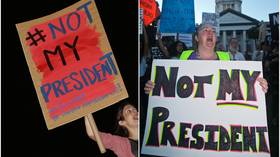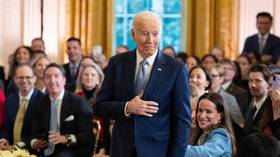Trouble in store: How highly paid, job-secure lockdown zealots have helped kill off the British high street
UK department store chain Debenhams is to close with the direct loss of 12,000 jobs. Yet the well-off ‘experts’ continue to champion ruinous lockdowns, oblivious to the devastation they are wreaking on people’s lives.
It was more than just a shop. Debenhams was part of British life. Part of the national fabric. It was a Clark who started it. William Clark (no relation, or at least not that I am aware of), began trading as a draper’s store in 1778. Thirty-five years later, Mr. Debenham became a partner and the name changed to Clark & Debenham.
Now, Debenhams is no more. Or rather it will be no more once its fire sale is over.
2020 is sucking the pleasure out of so many things, not least in regard to shopping. ‘Click and Collect’ is being aggressively promoted, but the joy of shopping is in the lingering. In the browsing. But the ‘experts’ don’t want us to do that. They want us to queue up to go into a shop, quickly make a purchase and leave.
Earlier in the week, the behavioural psychologist and well-heeled political activist Professor Susan Michie of SAGE and ‘Independent Sage’ tried to terrify us still further by saying that going into non-essential shops was like playing “Russian roulette.”
Michie claimed, “We’re all taking a gamble any time we’re putting ourselves into a place where other people are who might be infected.” Did she even stop to think, or care, how her comments might affect the trade of these ‘non-essential’ shops?
Sage member Professor Susan Michie says going into non-essential shops is like playing a game of "Russian roulette" in case there are people with Covid-19 inside@TomSwarbrick1https://t.co/I1s3AfXOrj
— LBC (@LBC) November 29, 2020
Like many other department stores, Debenhams wasn’t in rude health going into 2020, which I commented on in the Daily Express in January, but lockdown delivered the final blow. As it did to the wonderful Edinburgh Woollen Mill, founded in 1946, but now in administration.
Back in the 1980s, the EWM owned racehorses. Now, like all the other companies that have collapsed since March, its race is run. You really didn’t have to be Nostradamus to predict the disastrous impact that lockdowns and other Covid-19 restrictions would have not just on the high street, but the economy in general.
Put another way: how could the government order the shutdown of millions of businesses without there being a disastrous impact in terms of jobs and a cataclysmic fall in GDP? Yet, incredibly some thought there would be no great price to pay. That we could just carry on locking down for months on end and then everything would be absolutely hunky dory afterwards.
Also on rt.com Wanting the UK lockdown to end does not make you a nasty right-wing capitalistAs labelling people ‘deniers’ is all the rage, perhaps we could call these people – who tweeted the ‘#ExtendtheLockdown’ hashtag in May and June – as ‘basic rules of economics deniers’. Now, they very publicly shed crocodile tears for jobs lost and call for more ‘support’ for those out of work, yet they advocated the very policies which were guaranteed to bring these unhappy outcomes about.
The Labour Party has been particularly disingenuous. “Thousands of Debenhams staff and their families face huge uncertainty this Christmas. Retail workers across the country will be worried about the future. Our high streets face a defining few months. We must fight to protect good jobs and good businesses,” tweeted Labour leader Sir Keir Starmer when the news broke. But Labour’s line throughout the year has been to push for even tougher restrictions.
What all the advocates of lockdowns and draconian restrictions on business have in common is that they’re all in highly paid and secure jobs, usually in the upper echelons of the public sector. This is the real Covid divide of 2020.
I’m not just referring here to government ministers like Health Secretary Matt Hancock, who gets £141,000. Or pro-lockdown MPs on £82,000, plus all the other perks. Or the well-paid union leaders. Or indeed the well-heeled government scientists and members of SAGE. Chief Medical Officer Chris Whitty is on a salary of £200,000.
Today, Whitty tweeted that the newly authorised vaccine was only a “step” towards normal and strongly hinted that restrictions would need to continue until at least the spring. How many more businesses will that bankrupt? But rest assured Chris will still be getting his salary paid in full each month, whatever happens.
And then there’s the high-profile lockdown- promoting ‘A-List’ media celebrities too, like Piers Morgan, the co-presenter of Good Morning Britain, who tweeted in 2017 that he gets paid £22.5 million a year.
Also on rt.com British retail giant Debenhams likely to collapse, putting 12,000 jobs at riskWhen I hear these people spout off about how restrictions shouldn’t be eased, or need to be strengthened still further, I am always reminded of the words of Upton Sinclair. “It is difficult to get a man to understand something when his salary depends upon his not understanding it,” the great American novelist once said. We can update Upton for 2020: “It is difficult to get a man to understand the negative effects of lockdowns and draconian Covid restrictions when his salary won’t be adversely affected by them.”
Just a day before the sad news about Debenhams was announced, Neil Ferguson, on whose modelling lockdown was based, appeared on the BBC’s Newsnight programme to say that he had received hate mail.
We were all meant to feel very sorry for him. Don’t get me wrong, sending hate mail is wrong. But it is surely Ferguson who should be saying sorry to everyone else. He remains in a well-paid, secure position as a professor at Imperial College. Ferguson said, “As a scientist who has been quite prominent at times in the epidemic for me and people like me, it has been, at times, very difficult.”
As ‘difficult’ as it is for Debenhams staff who were told, just a few weeks before Christmas, that they had lost their jobs? What kind of Christmas will they have?
Britain is heading for mass unemployment in the New Year. But the people who urged, and propagandized, for ruinous lockdowns which have put the country on course for its worst slump for 300 years will be immune to its consequences. And it really didn’t have to be this way. Countries which didn’t lock down or shut down entire sectors of their economy have had lower death rates from Covid-19 than those which did. Just compare per capita deaths in Belarus and Sweden with Britain and Spain. Or consider that the countries at the top of the per capita deaths table, Belgium and Peru, both locked down hard and early.
There is no evidence that lockdown led to a net saving of lives (quite the contrary in fact). But there is evidence – all around us – of the economic destruction it has caused. Lockdowns, even on their own terms, don’t work, but the sad truth is that only when those advocating continued restrictions start losing THEIR jobs and their high salaries will the situation change.
Think your friends would be interested? Share this story!
The statements, views and opinions expressed in this column are solely those of the author and do not necessarily represent those of RT.













